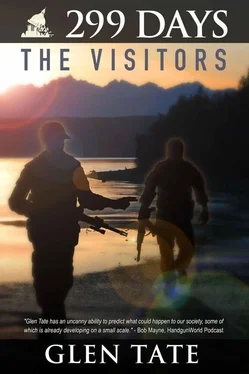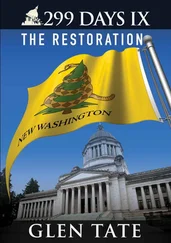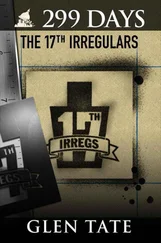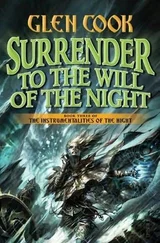Grant didn’t appreciate that last comment. “No, I didn’t know there was a war, at least a formal one. Is there one?”
“What does it matter if there’s a ‘formal’ war?” Ted asked.
“Because if there’s a formal war then I’m not as concerned about things like killing people without knowing for sure that they’re a threat,” Grant said. “You see, Ted, we’re following the Constitution out here. It’s kind of a big deal.” That was Grant’s sarcastic zinger. “That means treason takes the testimony of two eyewitnesses and it’s done in a real trial, with a jury and everything. It’s in the Constitution,” Grant said.
“Yeah, I know,” Ted said. Ted had studied the Constitution extensively. He thought Grant was just being a lawyer.
“Well, OK,” Grant said, “the Constitution also has provisions about wars. It’s not precisely the same, but the power of habeas corpus can be suspended in times of war or insurrection. In a war, we operate under the laws of war, which authorizes actions without trials. Obviously. You couldn’t fight a war if you had to have trials. So I’m more OK—actually, I’m fine—with killing Loyalists if there’s a formal war. So is there?” Grant asked.
“Yes,” Ted said. OK, maybe Grant was coming around.
“Not sure whether this counts as ‘formal,’” Ted continued, “but the Patriots in most states have gotten together and declared their states to be ‘Free.’ So, for example, there is a ‘Free Washington State,’ a ‘Free Oregon,’ and so on. That means there’s an organized group in most states that are claiming the state for the Patriots. Some of the Free movements are larger than others, depending on the state. Texas is almost entirely a Free state; the Feds have pretty much taken off from there.”
“Anyway,” Ted continued, “when the Free State movements started a few days after May Day, the Feds declared that this was a formal ‘insurrection,’ which triggered a bunch more emergency powers. A declared insurrection is an act of war in many people’s books.” Ted knew the intellectual debate about whether a declared insurrection was technically a “war.” He had a Masters’ degree in the history of warfare from the correspondence courses he took in the Army. It was a real degree. Ted, like almost all SF, was extremely intelligent.
“But,” Ted shrugged, “it’s still a little fuzzy. No real declaration of war. You can imagine that the Feds don’t want to advertise that their country is breaking up so there hasn’t been any announcement to the civilian population, but it’s as close to a declared war as you usually get in civil wars,” Ted said, referencing his long study of the subject.
Grant realized that Ted knew what he was talking about. He had a good point about this being a war. Grant needed to show the Team that he wasn’t a stubborn dick.
He looked at Ted and said, “OK, man, I didn’t know. That changes my mind. There’s a war. A war for legal purposes. So we can go get them,” he said, referring to the Loyalists. “But I want to be careful about it. I’m trying to hold this place together under the Constitution so it doesn’t become a lawless group full of revenge killings.”
Ted nodded. “A laudable goal,” he said, “and one we share. “But, if we get smoked out by Loyalists and some regular Loyalist Army unit comes here, onto the nearly unguarded beaches you have, by the way, then we’re all dead. Your family is dead. And the Constitution is dead out here, too.”
It was silent. Ted had a point; an extremely good point, but one that was really hard to accept. We have no choice but to kill people we disagree with—and this is all to save the Constitution? That was true only in the rarest of circumstances, but this was the very rarest of circumstances.
Ted had been through this mental exercise before. It was part of his Special Forces training on getting indigenous forces to side with the Americans. A big part of that was specific tactics to convince leaders of indigenous forces to join the American side. Special Forces was sometimes more political and diplomatic than military. Ted used the technique from his training for the reluctant fighter: switch to practical details to get them thinking.
“So, who are the Limas out here who will try to kill us?” Ted asked Grant. “You know, Loyalists,” Ted said. “Ls. You know, ‘Limas’.”
“Lima” was the phonetic alphabet term for “L.” Like Alpha, Bravo, and Charlie were the phonetic alphabet terms for “A,” “B,” and “C.” Ted and the other Patriot military people called Loyalists “Limas,” like Ted did in Afghanistan, where the troops called terrorists “Tangos,” which was the phonetic alphabet for “T.” He and his colleagues would say “Tango down” when they killed a terrorist. Using a phonetic alphabet term dehumanized the person. He wasn’t a person; he was a Lima or a Tango.
“Snelling,” Grant said instantly. Grant described Snelling and all the Grange debates they’d had.
“And his douchebag sidekick, Dick Abbott,” Grant added. He told them about Abbott.
“That’s it?” Ted said. “Two enemy leaders out here? That’s great. Not too many. This should be easy.”
“What should be easy?” Grant asked. He was still in denial.
Chapter 164
“So, Who’s In?”
(July 3)
“Killing them, Grant. Killing them is what should be easy,” Ted said. He was being gentle with Grant because he could tell that he was a decent guy who needed to come to the conclusion about killing these people on his own. Chip had told Ted about the looters, so he knew that Grant had it in him.
Chip had also told Ted that Grant had a calm head after the shooting in preparing for a counter attack and then bugging out before the cops got there. So, Grant could do these things; he just needed a little coaxing to do them in a…premeditated way. “Premeditated” was the wrong word. That sounded like murder. This wasn’t murder. It was war. Grant needed to get used it and make the mental shift.
The political animal in Grant was feeling that he was about to be marginalized and lose his ability to persuade the Team. He had been doing so well ever since they got out there. Extremely well, actually. Now he was stumbling. He was being shown to be weak and clinging to the old ways. Shit, he realized he had normalcy bias, which was the worst thing someone could have out there. Grant had to do something to show he wasn’t living in the past. He had to authorize the killing of the Loyalists.
“OK,” Grant said. “Snelling and Abbott can go. But I have one condition.” Grant quickly realized that he had no ability to require any conditions, but he had already said it, so he might as well roll with it.
“I want some evidence that they are actively out to kill us,” Grant said. “Not much evidence, just a little. Just…enough.”
Ted knew this was Grant’s bottom line. Ted needed Grant to have a huge role in the Pierce Point indigenous fighters. He decided to give in.
“OK, a little evidence,” Ted said. “Then we can kill them.”
“Deal,” Grant said. He realized that saying “Deal” was conspiracy to commit murder. Another crime under the old laws to be put on Grant’s long list of offenses. He was dead if the Loyalists held onto power. He had picked sides and there was no turning back. That had happened a long time ago. This was just reinforcing it.
“Back to what we hope to do out here,” Ted said. He wanted to turn to the tactical details.
“Recruit, train, supply, and lead 100 or so fighters from Pierce Point and ones we bring in,” Ted said. “That’s not what we hope to do,” he said. “That’s what we’re going to do,” he said confidently. Ted needed these guys to be confident. And Ted was genuinely confident. They had a great setup out there and a core group of guys, like the Team who Ted knew personally and had even helped train. Ted was in a much better situation there than in the various hell holes where he’d done this before.
Читать дальше











